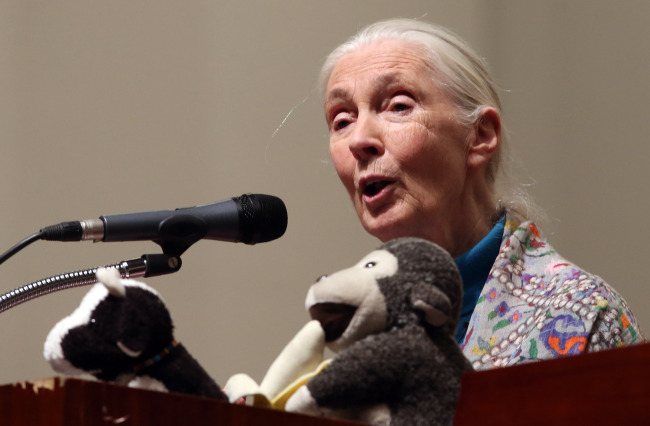For someone who garnered worldwide fame for working with chimpanzees, writing about plants appears to be an odd choice.
But primatologist and environmentalist Jane Goodall said, at a recent talk, that protection of both plants and animals was essential to humankind’s task of preserving the environment.
This is one of the reasons she emphasized the critical role plant life plays in our world in her book “Seeds of Hope,” Goodall said during a lecture Tuesday at Ewha Womans University.
She said that the destruction previous generations have wreaked on nature is depriving children of hope.
“They say, ‘You’ve harmed our future. There’s nothing we can do about it.’ Every time I think how we’ve harmed this beautiful planet, I feel ashamed,” she said.
 |
British primatologist Jane Goodall speaks during a lecture at Ewha Womans University on Tuesday. (Yonhap) |
“To bring children into the world and give them no hope (for the future). What a cruel thing it is,” Goodall said. “But is it too late to do something? No, I truly believe we have a window of time to make a change.”
Goodall lamented the fact that people are committed to economic development at the expense of the environment.
In order to save our planet, she said that people should start by making changes in their everyday lives. “The main message is every single one of us makes a difference every single day we live,” she said.
She also spoke out against animal cruelty, emphasizing that animals are capable of having personalities and emotions. She mentioned that while studying chimpanzees she found that they were capable of love, compassion and altruism.
“It was obvious that they have their own personalities. They’re different as we are. They show emotions like happiness, sadness and fear. Just like us,” she said.
At the age of 80, the British primatologist appeared as passionate as she was when she went off to study wild chimpanzees in Gombe Stream National Park, Tanzania. She said she had recently visited Taiwan, Japan, China, Singapore and even North Korea to spread her message.
“What is keeping me going? The world is filled with problems. I passionately care about animals and the environment and I have a message to deliver,” she said.
What helps her in the process is the nonprofit organization Roots and Shoots, which she founded in 1991. The nonprofit, which hopes to bring together youth to work on environmental and humanitarian issues, is currently based in 138 countries and has 150,000 groups, she said.
Despite the hardships humankind has put the environment through, Goodall said there was still hope for a better future. Her “greatest reason to hope,” she said, it that the youth share her passion and are working for the same cause as she is.
Another reason for hope, she said, is that the human brain is still capable of coming up with technologies that will help us coexist better with nature.
Finally, nature itself is highly resilient, she said. For an example, Goodall cited Gombe Park, where she went to study the primates she eventually came to deeply care for.
Upon her arrival, the chimpanzees were surrounded by a barren wasteland because underprivileged people in the area had burned down all the trees to make a living.
“When we began a program to help them live better lives in an environmentally sustainable way, trees returned. Ten years ago, chimps were surrounded by bare hills; now there are trees there,” she said.
Goodall is best known for her 55-year study of social and family interactions of wild chimpanzees. She was designated U.N. Messenger of Peace in 2002.
By Yoon Min-sik (
minsikyoon@heraldcorp.com)








